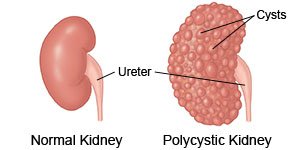Autosomal Dominant Polycystic Kidney Disease
Medically reviewed by Drugs.com. Last updated on Jun 5, 2024.
Autosomal dominant polycystic kidney disease (ADPKD) is a condition that causes many cysts to grow in your kidneys. ADPKD is most often caused by damaged genes, which are inherited from a parent. The cysts may become large and damage your kidneys. When damage occurs, your kidneys may not work properly, or may stop working completely.
 |
WHILE YOU ARE HERE:
Informed consent
is a legal document that explains the tests, treatments, or procedures that you may need. Informed consent means you understand what will be done and can make decisions about what you want. You give your permission when you sign the consent form. You can have someone sign this form for you if you are not able to sign it. You have the right to understand your medical care in words you know. Before you sign the consent form, understand the risks and benefits of what will be done. Make sure all your questions are answered.
An IV
is a small tube placed in your vein that is used to give you medicine or liquids.
Medicines:
- Antibiotics may be given to help treat a bacterial infection if you have a urinary tract infection (UTI).
- Blood pressure medicines are used to keep your blood pressure normal. This may help decrease or prevent further damage caused by ADPKD to your kidneys.
- Cholesterol medicines are given to help lower the amount of cholesterol in your blood.
- Pain medicines may be recommended.
Tests:
- Blood tests may be done to give healthcare providers information about how your kidneys are working.
- A urine test checks for blood or infection in your urine.
- A chest x-ray is a picture of your lungs and heart. Healthcare providers use the chest x-ray to see if your heart is enlarged.
- An ultrasound uses sound waves to show pictures on a monitor. An ultrasound may be done to show if you have a kidney stone, cysts, or other kidney problems.
- A CT or MRI scan may be used to take pictures of your kidneys or to check other organs for cysts. The pictures may show the size and amount of cysts you have. You may be given a dye before the pictures are taken to help healthcare providers see the pictures better. Tell the healthcare provider if you have ever had an allergic reaction to contrast dye. Do not enter the MRI room with anything metal. Metal can cause serious injury. Tell the healthcare provider if you have any metal in or on your body.
- A renal angiography is a test that uses x-rays to take pictures of the blood vessels in your kidneys. Before the x-ray, a catheter (long, thin, bendable tube) is inserted into a blood vessel in your groin. Dye is put into the catheter, and x-rays are taken as the dye goes to your kidneys. The dye helps the blood vessels show up better on the x-ray pictures. Tell the healthcare provider if you have ever had an allergic reaction to contrast dye.
Treatment:
You may need any of the following if your kidneys are badly damaged or are no longer working:
- Aspiration is a procedure that is done to shrink your cysts. A long, thin needle is carefully pushed through your skin to reach your kidneys. Your healthcare provider will use a syringe to drain fluid from your cysts. Aspiration may decrease any pain you are feeling in your back and sides.
- Dialysis is a procedure done to remove extra water, wastes, and harmful chemicals from your blood. You may need dialysis when your kidneys do not work properly, or stop working completely.
- A special diet may be recommended by your provider to help slow the progress of your disease. You may need to limit protein and sodium (salt). Ask your provider about these and any other diet changes you need to make.
- Nephrectomy is surgery to remove a kidney. A nephrectomy may be done if your enlarged kidney is causing pain. It may also be done if you will be getting a kidney transplant.
- Kidney transplantation is surgery to replace your damaged kidney with a healthy kidney. The healthy kidney will come from a donor.
Treatment options
The following list of medications are related to or used in the treatment of this condition.
RISKS:
Pain medicines may cause further damage to your kidneys. Even after you have an aspiration procedure, your cysts may become large again, and your pain may return. Without treatment, the cysts in your kidneys may continue to grow. Your pain may become worse. Your cysts may cause complete damage to your kidneys and lead to kidney failure. Your blood pressure may remain high, and you will be at risk of heart problems and a stroke. You may also be at an increased risk of an aneurysm in your brain. Aneurysms are weak blood vessels that may grow and burst. This may cause bleeding in your brain. These problems can be life-threatening.
CARE AGREEMENT:
You have the right to help plan your care. Learn about your health condition and how it may be treated. Discuss treatment options with your healthcare providers to decide what care you want to receive. You always have the right to refuse treatment.© Copyright Merative 2024 Information is for End User's use only and may not be sold, redistributed or otherwise used for commercial purposes.
The above information is an educational aid only. It is not intended as medical advice for individual conditions or treatments. Talk to your doctor, nurse or pharmacist before following any medical regimen to see if it is safe and effective for you.
Learn more about Autosomal Dominant Polycystic Kidney Disease
Treatment options
Care guides
Symptoms and treatments
Further information
Always consult your healthcare provider to ensure the information displayed on this page applies to your personal circumstances.
